SPECIAL REPORT
Solar panels are not an instant magnet in housing market, warns FNB report

Installing solar panels on your home’s rooftop is not an instant ray of light for buyers if you want to sell. It all depends on the price segment your home falls in. Wealthier buyers, for example, have the resources to do their own thing. These are among the key takeaways of a special report that FNB has done on the issue.
FNB’s latest monthly Property Barometer featured a special report on the impact of rolling power cuts on the preferences of buyers. The findings go against the grain of conventional wisdom, which would hold that the surge in blackouts over the past 12 months should make the installation of solar panels an instant ray of light for buyers.
But many are not rising to the bait, it seems.
“Surprisingly, 64% of agents believe that pre-installed energy solutions are not a key consideration for prospective buyers. At first, this may seem counterintuitive, given the disruptiveness of load shedding and the increased investment into alternative energy sources by households and corporates alike,” FNB said.
“However, the truth is more nuanced. Fifty-six percent of agents in the affordable market state that energy solutions are, in fact, a key consideration for buyers in their market. In the traditional market, only 30% of agents believe that solar installation is an important consideration.”
The “affordable market” is under R750,000 for a property while the “traditional market” refers to those that fetch a price tag above that.
 This points to a glaring gap on the solar front between more affluent households and buyers and those with smaller bank accounts.
This points to a glaring gap on the solar front between more affluent households and buyers and those with smaller bank accounts.
“Wealthier households are more indifferent, likely because they have superior access to savings and funding options, and therefore can always install these themselves with relative ease which also allows for customisation,” FNB said.
Another salient point is that a solar system depreciates over time. The sun will emit energy for a long time to come, but the infrastructure to capture it is not an asset that retains its value.
“Customisation allows these prospective buyers to eliminate the risk of information asymmetry. Solar systems depreciate over time and require regular maintenance for optimal performance. Thus, having greater control of the type and quality of the installed system would give these buyers peace of mind. By contrast, lower-income households have limited funding options and would much rather buy a house pre-installed with a solar system,” FNB said.
FNB also asked: “Are buyers willing to pay a premium for properties that have a solar system installed?
“Results suggest that most buyers are not willing to pay a premium for solar systems, with 74% of agents responding ‘No.’ Once again, there are critical nuances across the purchase price. Half of surveyed agents (50%) in the affordable market suggest that buyers are willing to fork out a premium, compared to just 18% in the traditional market,” FNB said.
So, if buyers are willing to pay a premium for solar panels, how much are they willing to fork out?
“On average, the estimated average premium for a solar-installed home (based on those willing to pay) is approximately R79,000 and varies markedly across price buckets. In the affordable market, the average premium is approximately R25,000, compared to R126,000 in the traditional market. As a proportion of the purchase price, most agents (69%) estimate the ‘solar premium’ to be within the 0-5% range, while 22% believe it lies within the 6-10% range,” FNB said.
The bottom line is that solar is not a game-changer for higher-priced homes but is for those in lower brackets. Solar installation of R100,000 for example is a big investment in a house worth R700,000. But one of R200,000 in a house worth R5-million is a different story.
Of course, installing solar panels is about much more than adding potential value to your property. If you happen to work from home, it’s about the sheer convenience of uninterrupted power, lower electricity bills, and doing your bit for the green energy transition while bearing in mind that the panels you install also have a carbon footprint.
But FNB’s findings suggest it will not always lead to a surge in your price outside of the “affordable segments”. If rotational power cuts reach Stage 8 or double digits, that could change. DM

















 Become an Insider
Become an Insider
Comments - Please login in order to comment.